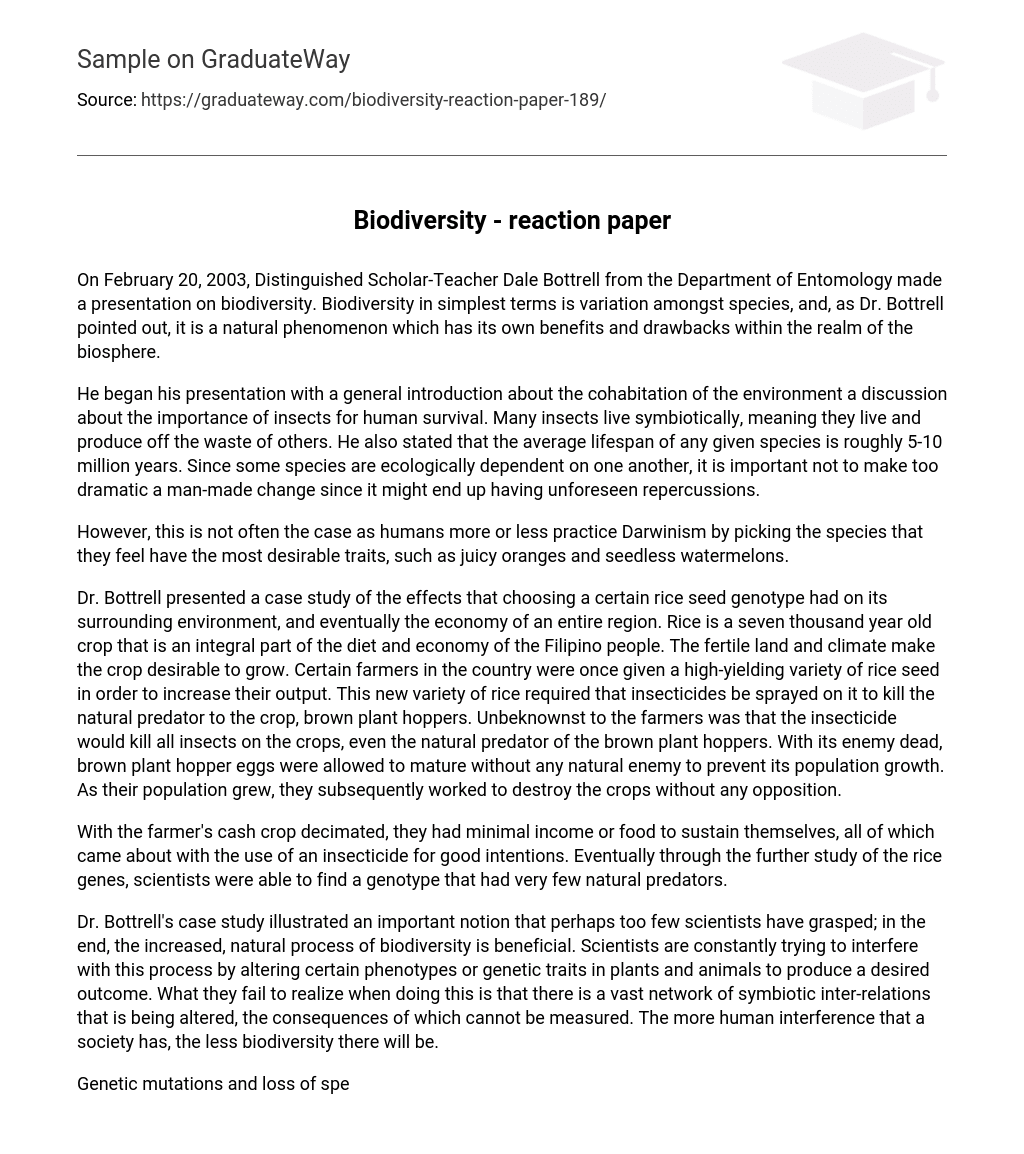On February 20, 2003, Distinguished Scholar-Teacher Dale Bottrell from the Department of Entomology made a presentation on biodiversity. Biodiversity in simplest terms is variation amongst species, and, as Dr. Bottrell pointed out, it is a natural phenomenon which has its own benefits and drawbacks within the realm of the biosphere.
He began his presentation with a general introduction about the cohabitation of the environment a discussion about the importance of insects for human survival. Many insects live symbiotically, meaning they live and produce off the waste of others. He also stated that the average lifespan of any given species is roughly 5-10 million years. Since some species are ecologically dependent on one another, it is important not to make too dramatic a man-made change since it might end up having unforeseen repercussions.
However, this is not often the case as humans more or less practice Darwinism by picking the species that they feel have the most desirable traits, such as juicy oranges and seedless watermelons.
Dr. Bottrell presented a case study of the effects that choosing a certain rice seed genotype had on its surrounding environment, and eventually the economy of an entire region. Rice is a seven thousand year old crop that is an integral part of the diet and economy of the Filipino people. The fertile land and climate make the crop desirable to grow. Certain farmers in the country were once given a high-yielding variety of rice seed in order to increase their output. This new variety of rice required that insecticides be sprayed on it to kill the natural predator to the crop, brown plant hoppers. Unbeknownst to the farmers was that the insecticide would kill all insects on the crops, even the natural predator of the brown plant hoppers. With its enemy dead, brown plant hopper eggs were allowed to mature without any natural enemy to prevent its population growth. As their population grew, they subsequently worked to destroy the crops without any opposition.
With the farmer’s cash crop decimated, they had minimal income or food to sustain themselves, all of which came about with the use of an insecticide for good intentions. Eventually through the further study of the rice genes, scientists were able to find a genotype that had very few natural predators.
Dr. Bottrell’s case study illustrated an important notion that perhaps too few scientists have grasped; in the end, the increased, natural process of biodiversity is beneficial. Scientists are constantly trying to interfere with this process by altering certain phenotypes or genetic traits in plants and animals to produce a desired outcome. What they fail to realize when doing this is that there is a vast network of symbiotic inter-relations that is being altered, the consequences of which cannot be measured. The more human interference that a society has, the less biodiversity there will be.
Genetic mutations and loss of species are just some of the outcomes of human interference on various ecosystems. Species are going extinct at an alarming rate because of the purposeful destruction of habitats which happens through pollution, the razing of rainforests, etc. This might not seem to be a big deal since there are millions of species on Earth, the death of a few might seem barely noticeable Scientists and the rest of society and general need to realize the scope of their actions, and the long term affect it has on society.
There is no accurate measure of biodiversity, as the Insight… article by Purvis and Hector illustrates. It is a multidimensional concept that cannot be expressed with statistical data. Species richness and evenness are just a few of the dimensions that can express biodiversity. Information on these two dimensions can be used to know the working of all the inter-relationships and thus better understand the effects of biodiversity. Biodiversity thrived on the lack of interference for millions of years, and humans, being the most destructive species on Earth, has decreased that.





